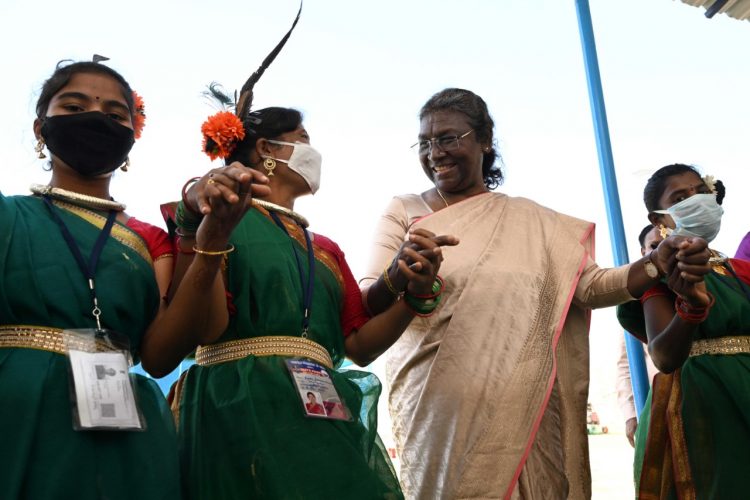The President of India Smt. Droupadi Murmu, laid the foundation stone for the project ‘Development of Pilgrimage Facilities at Bhadrachalam Group of Temples’ today at Sri Seetha Ramachandra Swamivari Devasthanam, Bhadrachalam in the Bhadradri Kothagudem District of the state of Telangana. She also laid the foundation stone for another project called ‘Development of Pilgrimage and Heritage Infrastructure of UNESCO World Heritage Site at Rudreshwara (Ramappa) Temple’ at Mulugu in the state. Both these projects have been approved under the PRASHAD (National Mission on Pilgrimage Rejuvenation and Spiritual Heritage Augmentation Drive) Scheme of the Ministry of Tourism, Government of India.
Addressing the gathering, the President noted that the famous temples of Telangana are visited by lakhs of pilgrims and they form the major component of domestic and foreign tourists. She said that tourism increases the livelihood opportunities and income of the people and also strengthens the local economy. The President appreciated the Ministry of Tourism for boosting the spiritual and cultural tourism by developing pilgrimage sites under the ‘PRASHAD’ scheme. Launched in the year 2014-15, the scheme aims to provide integrated infrastructure development to pilgrimage and heritage tourism destinations in the country.
President of India lays foundation stone for PRASHAD project in Bhadrachalam and UNESCO World Heritage Site at Rudreshwar Temple (Ramappa), Mulugu in Telangana
The temple at Bhadrachalam, Sri Seetha Ramchandra Swamyvari Devasthanam, is said to be more than 350 years old and is closely associated with epic of Ramayana. It is believed that Lord Rama with his wife Goddess Sita and brother Lakshmana spent some part of their 14 years of exile at a village called Parnasala, a part of Dandakaranya forest near Bhadrachalam Temple. The project ‘Development of Pilgrimage Facilities at Bhadrachalam Group of Temples, Telangana’ has been approved by the Ministry of Tourism at an estimated cost of Rs 41.38 Crores. The components sanctioned include infrastructural interventions like Pilgrimage Amenity Centre, Parking Area development, Kalyan Mandapam, Street-scaping, Souvenir shops, Rain and Shade Shelters and Railings, E-Buggies facilities for Senior citizens and Divyaangjans, overall civil infrastructure improvement, Drinking Water and Toilet Facilities, Food Court, Solar Based Lightings, CCTV Surveillance and Digital Interventions.
Noting that tribal people, especially from the Koya community, gather to offer prayers to Sammakka Saralamma jaathra, the President said that such festivals and gatherings strengthen social harmony. “With these activities, our traditions continue to grow from generation to generation. It is imperative to keep our culture, traditions and customs alive”, she said. Appreciating the Vanvasi Kalyan Parishad, Telangana, for organising this Sammelan, she said that the Parishad is constantly striving for the overall development of the forest dwellers. The running of development centers organizing camps in tribal areas to take women forward in the direction of economic empowerment by Vanvasi Kalyan Parishad were commendable, said the President.
The President Smt. Droupadi Murmu, later, virtually inaugurated two Ekalavya Model Residential Schools (EMRS) in Komaram Bheem Asifabad and Mahabubabad districts of Telangana. The Eklavya Model Residential School would be in every block with more than 50% tribal population of Scheduled Tribes and at least 20,000 tribal persons. The objective of EMRS is to provide quality upper Primary and Secondary and Senior Secondary level education (Class VI to XII) to Scheduled Tribe (ST) students in remote areas.





